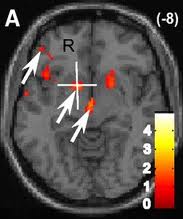A romantic rejection or breakup is one of the most common reasons people seek psychotherapy. Rejection makes us feel worse about ourselves and be more distrusting of other people. The grief of a breakup can feel overwhelming sometimes, making it difficult to get back out there. We may spend hours brooding or checking Facebook posts of our former partners. In this post, I will discuss how our brains process breakups, whether this emotional pain is similar to physical pain, and whether focusing on the positive can help us recover more quickly.
Your Brain on a Breakup
Your brain is likely to prioritize thinking about your ex-partner in the same way as it signals you to pay attention to physical pain. A study by cognitive neuroscientists at Columbia University used brain fMRI scans to look at brain activity in unmarried people who had experienced an unwanted breakup in the previous six months Participants looked at pictures of their ex-partners while thinking about shared experiences. The researchers compared the scans to when participants looked at pictures of a friend, or when they were exposed to pain via a hot probe on the arm. The scientists found that the same parts of the brain lit up when individuals looked at the ex-partner pictures or experienced physical pain, but not when they looked at the friend pictures.
These brain regions, including the insula and the anterior cingulate cortex, are associated with physical pain. Romantic rejection is not actually the same thing as physical pain, rather these brain areas light up because of “salience.” In other words, our brains signal us that both physical pain and photos of lost loves were important and worth attending to. For our ancestors, both pain and rejection (being thrown out of the tribe) could reduce the chances of actual survival, hence our brains may be wired to pay special attention to such experiences.
Does Focusing on the Positive Help?
One research study investigated whether an expressive writing intervention could help subjects feel better about their breakups. In this study of almost 100 college students with a recent (past 3 months) breakup, participants were assigned to write about either only the positive aspects of the breakup, only the negative aspects, or about a superficial topic (control group). Those in the positive-writing group reported experiencing more positive emotions when they thought about the breakup and had no increase in negative emotions. The positive emotions included empowerment, happiness, relief, thankfulness, and wisdom. If the breakup was mutual, the benefits of positive writing were even stronger. Perhaps focusing on the positive can eventually reprogram the brain’s reactions? This would likely take months or years. More research using actual brain scans is needed to assess this. Also, since these participants were college students, we don’t know if older people would experience the same effects. Since the brain only stops growing at 25, younger people may have a greater ability to effect change.
Take Home Message
If you’re having difficulty getting over an ex-partner, don’t think about the positive aspects of the relationship! Instead think about what you have gained by breaking up. This may force you to confront the negative aspects of your partner or the relationship, rather than being stuck in a romantic fantasy about it. You can also try distraction by going out and doing fun things (even if you don’t feel like it initially) or turn to a friend for support.



Interesting. It brings up the issue of perspective and how a person defines positive aspects.
Separations are powerful experiences. Defining them as beginnings and lessons learned, experiences necessary to move on to something better can create a positive emotional experience that an MRI can detect.
Thank you, Melanie. Fascinating.
author: Healing Your Hungry Heart, Conari Press. http://amzn.to/ibMVh2
Joanna,
Thank you for the insightful comments. I really like the specific new meanings you suggest. This is the stuff that works with my clients.I think the overall theme is to find a meaning that can help your self-esteem and create positive expectations for the future.
I found that focusing on the positive really helped me get over my divorce. I was devastated at first, yet once I started noticing the benefits of my breakup, I felt so much better.
Thanks for this, it sounds familiar…Is this study from Pennebaker's Healing Power of Expressing Emotions? He did a great deal of research regarding expressive writing and feeling better combined with brain research. I love his work as expressive art is a big part of my practice, and there is so much to support its use. I think it is healing through the emotions, to understand where the feelings are coming from (creating your story) and then to focus on developing positive ways of coping, affirmations, reframing, reworking. it;s alot of hard work, and it cannot be handed to a person.
Kathy,
This was a study using Pennebaker's method adapted to focus on positive emotions in one condition. Glad you like Pennebaker's work and use expressive arts. I also think creative self-expression, sometimes indirectly or nonverbally, is an important way of getting to know your own emotions and motivations and process them. I agree very much with your last comment as well. Reframing is individual as its up to each person to find their own lesson or meaning.
Ms Monet,
Thanks for commenting. It's nice to hear how people have applied this type of strategy in their lives.
Hi,
I found this whilst I have been trying to deal with a recent break up. I blog, but usually about the negative aspects of the relationship.
I will try to write now but from the positive aspect, and will see how that goes.
I have one started on positivity already – at myroadtoheal.blogspot.com and the negative ones have been addressed to my ex partner at letterstomydear.blogspot.com
Thanks